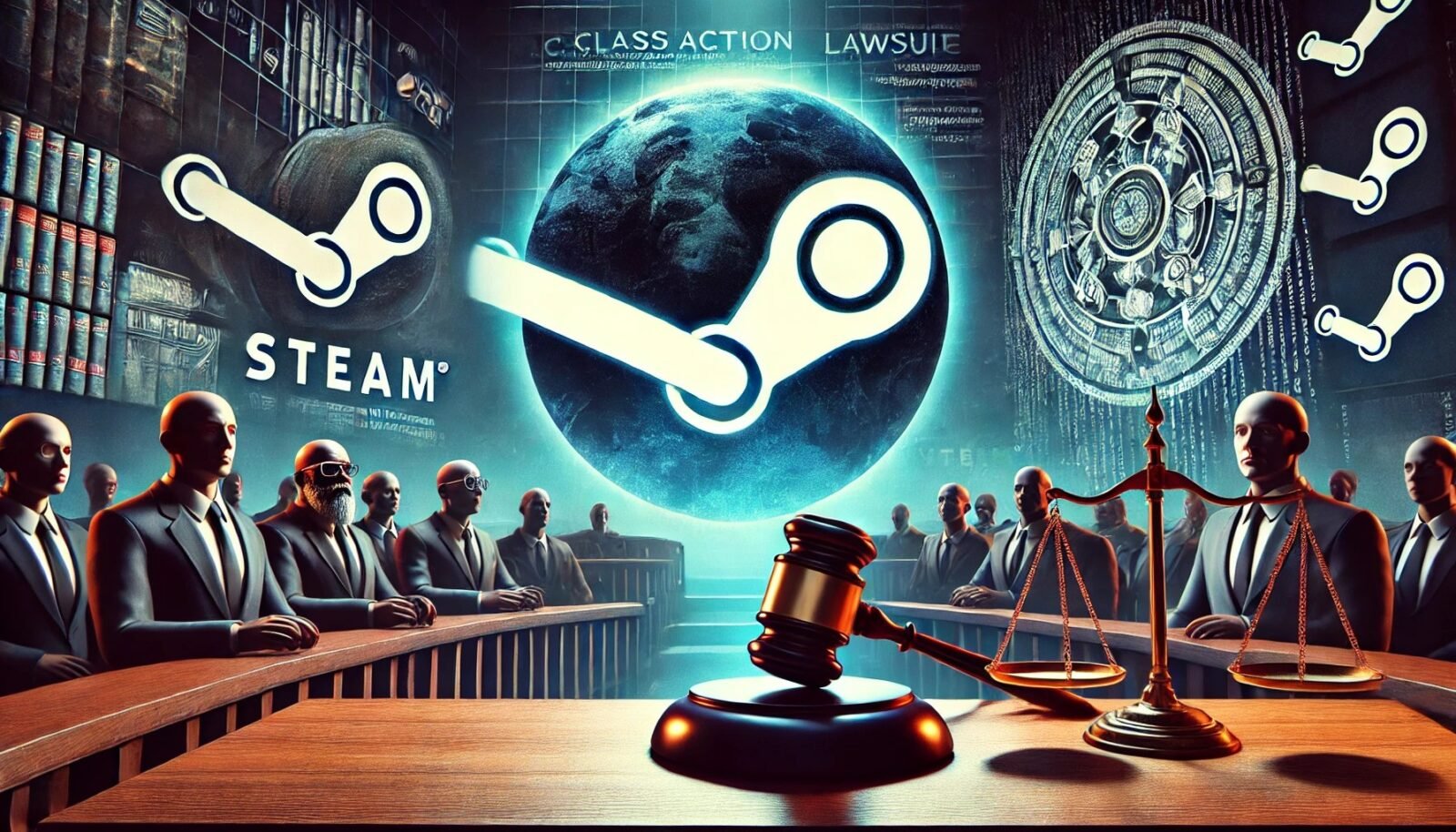Introduction to Steam and Valve Corporation
Steam is a popular digital distribution platform for video games and software. It allows users to buy, download, and play games on their computers. Gamers also use it for multiplayer gaming, sharing mods, and getting updates for games. Many gamers rely on Steam to manage their game libraries.
Valve Corporation is the company behind Steam. It was founded by two former Microsoft employees, Gabe Newell and Mike Harrington. Valve Corporation started in 1996 and became well-known after releasing the game Half-Life. Today, Valve Corporation is one of the biggest names in the gaming industry due to Steam and its success in providing a marketplace for developers and gamers.
This digital distribution platform gives developers a place to sell their games and gives gamers a reliable way to purchase and play games. Steam has millions of users worldwide, making Valve Corporation a key player in the gaming world.
What is a Class Action Lawsuit?
A class action lawsuit is a legal case where a group of people with similar complaints file a lawsuit together. These individuals, called the “class,” face the same harm or issue caused by the defendant. In a class action lawsuit, one or more people represent the entire group, and the outcome of the case applies to all members of the class. This type of lawsuit is useful when many people are affected by the same issue, but their individual claims may not be worth pursuing alone.
Why Are Class Action Lawsuits Filed in Consumer Protection Cases?
Class action lawsuits are often filed in consumer protection cases when a company harms a large number of consumers. These lawsuits help protect consumers from unfair business practices, defective products, or misleading information. By filing a class action lawsuit, consumers can hold companies accountable for their actions, even if the harm to each individual is small. This makes class action lawsuits a powerful tool in defending consumer rights and ensuring fair treatment.
The Steam Class Action Lawsuit: An Overview
The Steam class action lawsuit involves a legal case where a group of individuals has filed a claim against Valve Corporation, the company behind Steam. The lawsuit focuses on certain business practices that the plaintiffs argue are harmful to consumers and game developers. These practices include alleged violations related to antitrust laws and unfair competition.
Key Parties Involved in the Lawsuit
The main parties in the Steam class action lawsuit are the group of plaintiffs (which can include gamers, developers, or both) and Valve Corporation. The plaintiffs represent a larger group of individuals who believe they were negatively affected by Steam’s policies. Valve Corporation is the defendant, as it owns and operates the digital distribution platform.
The Main Claims Made Against Steam or Valve Corporation
The Steam class action lawsuit claims that Valve Corporation used its dominant position in the market to stifle competition. One key claim is that Steam forces developers to agree to certain pricing rules, limiting the ability to offer better prices on other platforms. The lawsuit also alleges that Valve Corporation has unfairly maintained its control over the digital distribution platform space, hurting both consumers and other businesses. These claims, if proven, could lead to significant changes in how Steam operates.
Reasons Behind the Lawsuit
The Steam class action lawsuit revolves around several alleged violations by Valve Corporation. The main claims include antitrust violations, where Steam is accused of maintaining an unfair monopoly in the digital distribution platform market. Plaintiffs argue that Valve Corporation used its dominant position to prevent fair competition, leading to higher prices and fewer options for both developers and consumers.
Additionally, the lawsuit claims unfair business practices, accusing Steam of forcing developers to follow strict pricing rules. This means that developers cannot offer lower prices for their games on other platforms, which limits competition and hurts both developers and consumers.
Specific Games or Developers Involved in the Dispute
While the lawsuit covers broad allegations, some specific game developers have raised concerns about Steam’s policies. Smaller indie developers, in particular, argue that Valve Corporation’s control over the digital distribution platform makes it hard for them to compete or offer competitive pricing. However, no specific games have been highlighted as central to the lawsuit, as the focus remains on Valve Corporation’s overall practices and their impact on the entire gaming industry.
Impact on Steam Users and Developers
The Steam class action lawsuit could have significant effects on both the Steam user base and game developers who rely on the platform.
How This Lawsuit Affects the Steam User Base
For the Steam user base, the lawsuit may lead to changes in how games are priced. If the claims of antitrust violations are proven, Steam users might see more competitive pricing as developers could offer lower prices on other platforms or directly to consumers. This could create more options and better deals for gamers who use Steam to purchase games.
Possible Consequences for Game Developers Who Publish on Steam
For game developers, the lawsuit could open up more opportunities to sell their games at competitive prices across multiple platforms. If the court rules in favor of the plaintiffs, developers might gain more freedom to set prices independently, which could lead to higher profits or the ability to offer discounts outside of Steam. On the other hand, developers who heavily rely on Steam’s infrastructure and audience might face uncertainty about how Valve Corporation will change its policies.
Any Changes in Terms of Service or Policies Following the Lawsuit
As a result of the class action lawsuit, Valve Corporation may be required to make changes to its terms of service or policies. This could include adjustments to pricing agreements with developers, allowing more flexibility for game sales on other platforms. Steam might also need to implement fairer competition practices to avoid future legal challenges. These changes would be designed to protect both consumers and developers from potential antitrust and unfair business practices.
Valve Corporation’s Response to the Allegations
In the Steam class action lawsuit, Valve Corporation has responded to the allegations made against them, defending their practices as fair and competitive.
Official Statements or Responses from Valve Corporation
Valve Corporation has publicly denied any wrongdoing in response to the class action lawsuit. They have stated that their policies are designed to benefit both consumers and developers. According to Valve Corporation, their platform provides a fair and competitive market for game distribution, and they claim that any restrictions are in place to ensure quality and security for users.
Actions They Have Taken to Address or Counter the Claims
As of now, Valve Corporation has focused on defending their current practices rather than making any significant changes. Their legal team has taken steps to challenge the claims in court, arguing that the antitrust and unfair business practices allegations are unfounded. While no major changes to Steam’s policies have been made as a direct response to the lawsuit, Valve Corporation continues to maintain its position that it operates in a fair and lawful manner.
Previous Legal Issues Faced by Steam
Steam and its parent company, Valve Corporation, have encountered several legal challenges over the years. These lawsuits have typically revolved around issues of antitrust, consumer rights, and digital distribution practices.
A Look at Past Lawsuits or Legal Challenges Steam Has Encountered
One notable lawsuit was filed in 2021, where Valve Corporation faced antitrust claims related to its dominance in the digital game distribution market. The plaintiffs argued that Steam forced developers into restrictive agreements that limited pricing options on other platforms. Another significant case occurred when Valve Corporation was sued over privacy concerns, with claims that Steam collected and stored user data without proper consent.
Additionally, Valve Corporation has faced challenges from European regulators over refund policies and the resale of digital games. These legal battles highlighted ongoing concerns about how digital distribution platforms operate.
Patterns in Legal Action Against Valve Corporation
There seems to be a recurring theme in the lawsuits against Valve Corporation—most involve claims of unfair business practices and antitrust violations. Critics argue that Valve Corporation uses its control over Steam to create barriers for competition and impose unfair conditions on developers. Despite these legal issues, Valve Corporation continues to maintain its strong position in the gaming market, often defending its policies as necessary for maintaining quality and security on the digital distribution platform.
Current Status of the Lawsuit
The Steam class action lawsuit is still ongoing, with court proceedings actively taking place. Both sides are presenting their arguments, and the case has yet to reach a final decision. As of now, no major settlements have been announced, and the legal battle continues between the plaintiffs and Valve Corporation.
Potential Outcomes of the Case
If the court rules in favor of the plaintiffs, Valve Corporation could face significant fines for antitrust violations and unfair business practices. Another possible outcome is that Steam may be forced to make policy changes, particularly regarding how game developers can price and distribute their games across other platforms. This could lead to increased competition in the market and more flexibility for developers.
Alternatively, if Valve Corporation wins the case, it would likely maintain its current practices, solidifying its position as the dominant digital distribution platform. The court ruling could set a precedent for how other platforms operate in the gaming industry, potentially affecting future lawsuits.
The Broader Implications for the Gaming Industry
The Steam class action lawsuit has the potential to reshape the digital gaming landscape. If successful, this lawsuit could set important legal precedents for other digital platforms, impacting how they operate and interact with both developers and consumers.
How This Lawsuit Could Set Legal Precedents for Other Digital Platforms
A ruling against Steam could establish new legal standards for digital distribution platforms. It may limit the ability of these platforms to impose restrictive pricing agreements on developers or engage in practices that limit competition. This could lead to stricter antitrust regulations and more oversight of how digital platforms control the market, ensuring fairer practices for both developers and consumers across the industry.
The Impact on Other Game Distribution Platforms Like Epic Games Store or GOG
The outcome of this lawsuit could directly affect competitors like Epic Games Store and GOG. These platforms, which are already trying to differentiate themselves from Steam, may gain more freedom to offer competitive pricing and attract developers who feel restricted by Valve Corporation’s policies. If Steam is required to make significant policy changes, it could level the playing field, allowing platforms like Epic Games Store and GOG to expand their market share and compete more effectively with Steam. This could ultimately benefit consumers by providing more choices and better pricing in the digital gaming market.
What It Means for Consumers: Your Rights on Steam
For consumers, the Steam class action lawsuit raises important questions about consumer rights when it comes to digital purchases. As more people turn to digital platforms for gaming, understanding these rights is crucial.
Consumer Rights in the Context of Digital Purchases
When you buy a game on Steam, you are purchasing a license to use that software, not the game itself. This means that your access to the game is subject to Steam’s terms of service and policies. However, consumers still have certain rights, such as the ability to request refunds within specific conditions. In the EU, for example, there are stronger consumer protection laws, giving users more power to get refunds or challenge unfair practices. The outcome of this lawsuit could influence Steam’s refund policies and overall treatment of users.
How to Be Aware of Potential Issues with Digital Platforms Like Steam
Consumers should be vigilant about the terms and conditions when purchasing from digital platforms like Steam. Key things to watch for include refund policies, game ownership terms, and pricing practices. The Steam class action lawsuit also highlights the need for consumers to be aware of how monopoly practices can affect their access to competitive pricing and choices in the marketplace. Staying informed and understanding your rights can help protect you from unfair practices when using platforms like Steam.
Conclusion
The Steam class action lawsuit has the potential to significantly impact both the gaming industry and consumers. At its core, the case raises important questions about antitrust violations, unfair business practices, and the rights of both developers and users on digital distribution platforms. As the legal battle unfolds, it could set new standards for how platforms like Steam operate, potentially leading to more competitive pricing, greater flexibility for developers, and stronger protections for consumers. Whether the outcome brings changes to Valve Corporation’s policies or reinforces its practices, this lawsuit will likely influence the future of digital gaming for years to come.
FAQs
What is the Steam class action lawsuit about?
The Steam class action lawsuit involves allegations that Valve Corporation engaged in antitrust violations and unfair business practices by restricting competition and controlling pricing policies on its digital distribution platform. The plaintiffs argue that these actions harm both consumers and game developers.
Who are the main parties involved in the lawsuit?
The plaintiffs in the lawsuit are a group of consumers and/or developers who believe they were negatively affected by Steam’s policies. The defendant is Valve Corporation, which owns and operates Steam.
How could this lawsuit affect Steam users?
If the lawsuit is successful, Steam users could see lower game prices and more options from developers who are no longer restricted by Steam’s pricing policies. The lawsuit may also lead to changes in Valve Corporation’s terms of service, which could improve consumer rights.
How might this lawsuit impact game developers?
For game developers, the lawsuit could lead to greater freedom in pricing and distribution. Developers may be able to sell their games at lower prices on other platforms, increasing competition and allowing them to reach a broader audience outside of Steam.
Has Valve Corporation responded to the lawsuit?
Yes, Valve Corporation has denied the allegations and maintains that its business practices are fair. Valve Corporation is defending itself in court, arguing that its policies benefit both developers and consumers.
What are the possible outcomes of the lawsuit?
If the court rules in favor of the plaintiffs, Valve Corporation may face fines and be required to change its policies, potentially leading to a more competitive marketplace. If Valve Corporation wins, it could continue its current practices with a stronger legal backing.
How does this lawsuit affect other digital platforms like Epic Games Store or GOG?
If the lawsuit results in changes to Steam’s policies, other digital platforms like Epic Games Store and GOG may benefit from increased competition. These platforms could gain more market share and offer better deals to consumers and developers alike.
What should consumers be aware of when using Steam or other digital platforms?
Consumers should pay attention to terms of service, refund policies, and pricing practices when using Steam or similar digital distribution platforms. Staying informed about your rights can help you avoid potential issues related to unfair practices.
What legal precedents could this lawsuit set?
The outcome of the lawsuit could set important legal precedents for how digital platforms operate, particularly regarding antitrust laws and the treatment of game developers. It may lead to increased regulation and oversight of the gaming industry.
When is the lawsuit expected to be resolved?
The Steam class action lawsuit is still ongoing, and it’s uncertain when a final decision will be reached. Court cases like this can take months or even years to resolve.
Read For More Amazing Blogs Law Firm Genius.
















Got a Questions?
Find us on Socials or Contact us and we’ll get back to you as soon as possible.